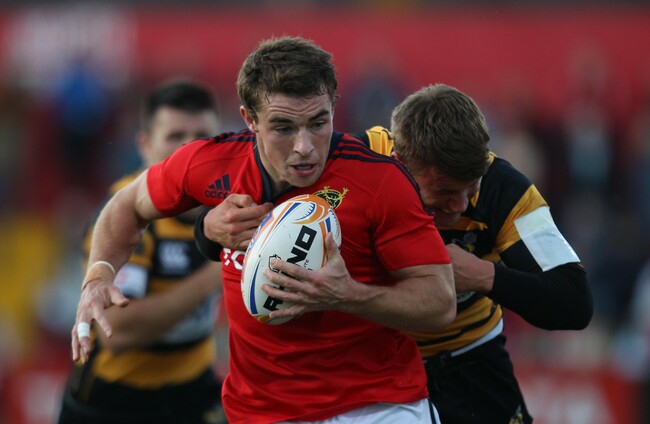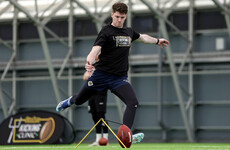CHRISTMAS DAY 2011 in the Scanlon household in Limerick. Turkey, ham, and a large serving of nerves all round.
23-year-old Sean was set for his senior Munster debut at fullback the following day against Connacht at Thomond Park, where John Hayes would bid farewell to professional rugby in front of more than 20,000 people.
So this wasn’t exactly a low-profile first game for Scanlon, who had been waiting patiently for his big chance. Everyone in the family was feeling the pressure.
“That week, we had actually trained out in Bruff, where ‘Bull’ Hayes is from,” says Scanlon, who has now confirmed his retirement from professional rugby at the age of 32 after spending seven seasons playing in the English Championship.
“We were out on Bull’s field when Tony McGahan told me I would be starting for Munster.”
Scanlon looked at home out on the pitch that St Stephen’s night as he grabbed Munster’s first try and made a few more breaks in a 24-9 win that happily sent Hayes off into quiet retirement from rugby.
For Scanlon, it was a “surreal” experience and everyone around him benefited.
“A load of my mates had money on me for first try, so everyone was telling me how much they made after,” he recalls with a laugh. “I couldn’t have asked for a better debut.”
It was a dream start in red for a man who hadn’t always dreamed of being a pro rugby player. His family had a GAA background and he played football for Limerick up to minor level.
But Scanlon was introduced to the oval ball at Crescent College Comprehensive College and across the road in Garryowen rugby club. Gradually, it became an obsession as he went on earn a place in Munster’s academy and play for the Ireland U20s.
Scanlon subsequently impressed in the All Ireland League with Cork Con – having picked UCC for college – and with the Munster A team, securing himself a development contract in the process.
Unfortunately, things didn’t kick on for him after that promising debut in 2011.
“At the time, the back three was absolutely stacked with an incredible bunch of players,” says Scanlon. “Felix Jones, Johne Murphy, Ian Keatley, and Scott Deasy were all playing a bit at 15, and myself.
“Then you had Doug Howlett, Denis Hurley, Keith Earls, Simon Zebo all on the wings capable of playing 15 too.”
Scanlon helped Munster A to the British and Irish Cup in 2012, enjoying working under Anthony Foley, then hoped a new senior head coach – Rob Penney – would mean more opportunity in the 2012/13 season.
That’s when injury struck. A pronounced herniated disc resulted in seven months on the sidelines and, having recovered, Scanlon realised he needed a move if he wanted to play.
Several Championship clubs showed interest and he opted for Rotherham, his research having underlined the club’s good record in being a launchpad for players to move onto bigger and better things.
Going from Munster to the Championship was, of course, a big shift. Scanlon remembers arriving for training the first day in Rotherham and walking across a cricket pitch to the changing rooms, wondering where the rugby pitch was. Out they went for training on the cricket pitch, which transpired to serve as a rugby pitch when required.
But they were good times as Rotherham were contenders for promotion into the Premiership in Scanlon’s first two seasons under Lee Blackett – now head coach of Wasps. They had crowds of 3,000 at some games and the buzz around the town was electric.
“We were professional players but it had a real club feel about it,” says Scanlon. “You’d be meeting fans, everyone mixing together, it was a great place to be.
“Munster is so big but you were nearly with a Garryowen or Young Munsters in Rotherham, all the supporters knew you and spoke with you. You were going out performing for these people who you’d meet in the clubhouse afterwards.”
Big-money Bristol beat them into the play-off final in 2015, whereafter things fell apart. Scanlon was approached by Doncaster and moved there in 2016 before switching to Nottingham a year later, linking up with fellow former Munster man Ian Costello – also now coaching with Wasps – and a contingent of Irish players.
Reflecting now, Scanlon says he loved playing in the Championship but he also saw the ‘Wild West’ side of it that many players refer to.
“That would be the financial stability at clubs,” explains Scanlon. “There’s a 12-week clause in your contract meaning that if you’re injured for more than 12 weeks, they have the option of terminating your contract.
“My third year at Rotherham, they let five guys go after they had been injured for 12 weeks or more. You sort of think, ‘Wow, this is fairly brutal.’”
He says there was always a gnawing sense of the unknown in the Championship.
“You sometimes hear things last as players at some clubs. You might hear the club are announcing things in the media but the players hadn’t been told about it.
“There are a couple of top clubs that are always fine but there’s always the threat of someone pulling money from a club. You rely heavily on the RFU, your gate receipts, and a backer. It’s always a danger that if the backer pulls out, we might not have jobs in the morning.”
Faced with that potentially grim situation, rugby players do what they do best.
“Champ players are well able to take the piss out of themselves. There might be dark thoughts but you make a laugh out of it and that fuels your week sometimes.
“Everyone is going around joking that ‘we probably won’t have jobs on Monday morning’ but it just takes the pressure off a little bit.
“It builds resilience because you have to acknowledge that it could be over at any point. There is also pressure to perform in that because you know you have to impress in case you need to go to another club.”
Scanlon agreed a new two-year deal as a player/coach with Nottingham in early 2020. That was just before the landscape shifted very dramatically.
First, the RFU drastically cut its funding of the Championship. Soon after, Covid-19 hit. All contracts were suddenly off the table and Scanlon was left with a decision.
He had interest from other clubs – a chance in France didn’t appeal because it would have meant such a big life change – but Scanlon has now chosen to retire from professional rugby.
“I had been considering it before but with all of that going on, it was the right time,” he says.
“As much as it came to an abrupt end, after a couple of months I realised that it was a bit of a blessing in disguise. I would probably have stayed in the game because that’s all I knew but now I had this opportunity to branch out and see what else was out there.”
Scanlon counts himself lucky to get out uninjured after a fulfilling career. He has swiftly moved into a new job with a company called LandTech, while he and his wife, Lesley, own a house in Nottingham.
While the community game is on hold for now, Scanlon is head coach of nearby Dronfield Rugby Club and may even play amateur rugby himself whenever things get moving again.
The Championship’s future remains very unclear so the Limerick man reckons Irish players should wait to see if and how it recovers before following what was a well-trodden route in England’s second tier over the last decade.
He feels grateful that the sport has brought him to this point and looks back in happiness, having signed off with the Supporters Player of The Season and Try of the Season awards at Nottingham in what proved to be his final campaign.
“I left on my own terms even with all that went on over the last year. I could have fought to stay in the game but I’m really happy with how everything has gone and I’m proud of my career. I achieved quite a lot and played a lot of rugby.”













Katie Taylor is an absolute class act, forget the critics, your fans know how great you are Katie. Bring on 2018.
@Brian Gibbons: the BBC has turned into a complete sh*t show! Terrible coverage, analysis, totally bias and as for that sports person of the year awards.. it’s a complete joke…
She got hit a lot. I was surprised too given the other girl was game but basically a novice.
@DuskyTheCat: I can only agree pal. Got hit a hell of a lot. And was hit in previous fights by lesser boxers!
@DuskyTheCat: she got roped into a slug fest when she should have just boxed. To be fair in terms of skill and speed there isnt another woman on the planet anywhere near as good as her. Unfortunately she does sometimes get caught in brawls which there is no need for.
Why can’t she take a bit of critisism? No doubt she is a good fighter but what they were saying seemed right.Might be too used to people saying how great she is, then when she gets a bit of stick can’t seem to handle it.If she came up against someone with real power she could be in serious trouble, she does get hit a lot.Take the critisism on board, (it is constructive) park it, then move on.
Sure Katie could pick and hit all fight but that’s not what gets the average person watching boxing.
From what I can see, Katie is being consciously more confrontational with in her pro boxing career for two reasons. Firstly, because the crowd respond to it and secondly because she knows she can get away with it due to the respective ability of the fighters she’s faced. I’m sure if Katie faced a better boxer she would revert to picking and hitting.
Despite all the money he has made, Mayweather is reviled by the average punter because he picks and hits. He got more credit when he was aggressive against McGregor but only did it because he could. Katie is right to fire back because whatever way she boxes, there’s always going to be someone criticising her.
IMO Katie doesn’t have KO power and should be a defensive fighter. She’d be untouchable a la first two rounds. After that sloppy, footwork and exits need to be better in future.
Rise above it Katie !upwards we go yeah yeah yeah champion
There riddled with the jealousy.
Katie is such a class act an has been for so long, she did get hit alot and to be fair her opponent got in her head, but also remember Katie has fought 8 times in 14 months. That’s amazing, and her opponent tried to make it a street fight, Katie still boxed the head off her, her opponent gave Katie no credit either, I can’t wait to see her fresh again and domanite.